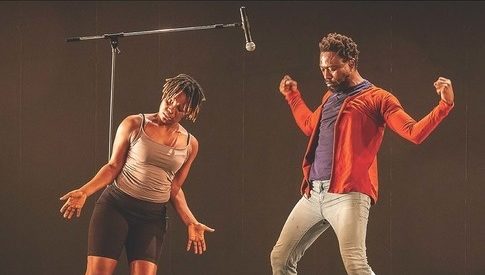Assistant Dance Professor Dr. Amy Swanson Presents Research on Contemporary Dance Theory in Senegal

As part of the Division of Arts and Humanities Spring 2021 Colloquium Series, Assistant Professor of Dance Dr. Amy Swanson discussed her research on the intersection of gender, sexuality and contemporary dance in Senegal at a virtual event entitled “Dancing Otherwise: Toward a Queer Theory of Contemporary Dance Pedagogy in Senegal” on Feb. 16.
The event focused on Swanson’s ongoing research from her book project, concentrating on a chapter regarding contemporary dance pedagogy. She first began the lecture by introducing Andréya Ouamba, a Congolese dancer and choreographer Swanson worked with while living in Senegal, and explained the significance of the term “otherwise” in his pedagogy of contemporary dance.
“For Ouamba, the term [otherwise] names the method, process and outcome of contemporary African dance, whereby leaning into uncertainty throughout dance practice enables performances that imagine possibilities outside of the known,” Swanson said.
Swanson conducted her research at dance studios in Dakar, where the French word “autrement,” or “otherwise,” is used interchangeably with words that convey a radical deviation from the norm. Swanson explained how Ouamba’s pursuit of the unknown through improvisational contemporary dance not only confronts the rigid relations between nationality and dance form, but also provides a potent social critique of complex power dynamics through the framework of gender and sexuality.
“Dancing otherwise demands a durational and reflective process that uncovers new terrain, new ways of moving, new embodiments that evade national, gender and sexual identification. Through improvisation and dialogue, otherwise encourages unfamiliarity and illegibility as a political stance,” Swanson said. “It stakes claim to alternative models of being in the world to those rendered ‘acceptable’ by dominant ideologies, whether it’s the Senegalese state and its hostile policies towards gender and sexual nonconforming individuals or the global contemporary dance circuit.”
According to Swanson, Ouamba dresses purposefully in gender nonconforming clothing to provoke conventional expectations of masculinity, ultimately underscoring his artistic objective to “travestir la dance.” The French word “travestir” translates to “the act of cross dressing, disguising or distorting,” encapsulating the aim of Ouamba’s pedagogical approach to use contemporary dance to challenge gendered social norms in Dakar.
To augment Ouamba’s challenge of gender and sexual binaries through improvisational dance, Swanson also drew on the work of Senegalese scholar Ayo Coley to consider the role queerness plays in conventional power dynamics of gender and sexuality. “The ability to evade power, to constantly refigure meaning and interfere with hegemonic regimes of signification, is queerness at work,” Coley said.
Swanson clarifies that her research is not about the sexual identities of the artists she discussed, nor does the term “queer” have significant bearing in the Senegalese context. Rather, her research focuses on the power of contemporary dance in conceiving alternatives to heteronormativity and Eurocentrism in African dance.
“I find queer theorizing in Senegal to be particularly urgent, given the ongoing backlash against the LGBTQ community, which can easily foster the idea of a monolithic, homophobic Senegal, or Africa,” Swanson said. “Although the criminalization of homosexuality has officially been in place in Senegal since the 1960s, the policy was rarely enforced, and Senegal was considered the gay haven of Francophone West Africa until somewhat recently.”
Swanson shared a quote from Ouamba during an intensive workshop he led with creative residency participants from different African countries: “‘The crux of contemporary dance is its capacity for difference, to imagine alternatives. You can do it otherwise, you can do it otherwise.’”
Ouamba’s dedication to “dancing otherwise” is a reminder that in the artistic realm and beyond, the power to instigate change emerges from pushing ourselves to pursue the unknown, encouraging us all to transcend familiarity in the pursuit of living “otherwise.”








